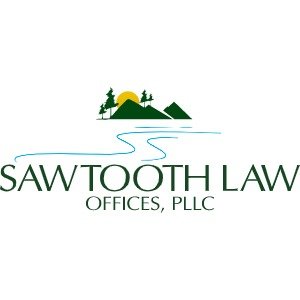Best Bankruptcy & Debt Lawyers in Twin Falls
Share your needs with us, get contacted by law firms.
Free. Takes 2 min.
List of the best lawyers in Twin Falls, United States
United States Bankruptcy & Debt Legal Articles
Browse our 2 legal articles about Bankruptcy & Debt in United States written by expert lawyers.
- Filing Chapter 7 in 2026 United States: New Income Limits
- Chapter 7 gives a near-total discharge of most unsecured debt, but you must pass a "means test" that compares your household income to your state's median income for your family size in 2026. The U.S. Trustee Program updates the state median income numbers at least once a year; you qualify... Read more →
- Debt Collectors in the US: Stop Harassment and Verify Debt
- You have strong federal rights under the Fair Debt Collection Practices Act (FDCPA) and CFPB Regulation F. Collectors cannot harass you, must send a validation notice, and must stop collecting until they verify if you dispute in writing within 30 days. Tell collectors to stop contacting you, then follow up... Read more →
About Bankruptcy & Debt Law in Twin Falls, United States
Bankruptcy and debt laws in Twin Falls, United States, are primarily governed by federal regulations. However, Idaho-specific legislation also applies when dealing with exemptions and certain aspects of the bankruptcy process. Understanding the legal complexities involved in bankruptcy and debt can enable indebted individuals or businesses to manage their financial situations more effectively. Bankruptcy can help provide a fresh start by eliminating debts or creating reasonable repayment plans.
Why You May Need a Lawyer
Engaging a lawyer might become necessary for several reasons. If you're overwhelmed by debt and considering filing for bankruptcy, a lawyer can help determine if it's in your best interest. Lawyers provide insights into the type of bankruptcy best suited for you (chapter 7, 11, 13 etc.), and help you navigate through legal procedures. Moreover, a lawyer can maximize your benefits by skillfully handling creditors and tackling legal complexities that arise during bankruptcy proceedings.
Local Laws Overview
While the Bankruptcy Code is federal and thus applies across all states, Idaho does maintain certain state-specific bankruptcy laws. These primarily concern exemptions-assets that you may keep even after filing for bankruptcy. In Idaho, these exemptions include a certain amount of equity in a primary residence, a vehicle, personal items like household furnishings and clothing, and some types of benefits and pensions. This is subject to various conditions and the advice of a local attorney can prove invaluable in such cases.
Frequently Asked Questions
1. Can all debts be discharged through bankruptcy?
No, not all debts can be discharged in bankruptcy. For instance, child support, alimony, most tax debts, student loans, court fees and penalties cannot be discharged.
2. What is the difference between Chapter 7 and Chapter 13 bankruptcy?
Chapter 7 bankruptcy discharges most of your unsecured debt, while in a Chapter 13 bankruptcy, you repay debts over time with a court-approved payment plan.
3. Will bankruptcy ruin my credit?
A bankruptcy can stay on your credit report for up to 10 years. However, the impact on your credit score diminishes over time, and you can start rebuilding your credit right away.
4. Can I keep any of my property if I file for bankruptcy in Twin Falls?
Yes, Idaho law provides several exemptions which allow you to keep a certain amount of personal property and equity in your home and vehicle.
5. Will my employer find out about my bankruptcy?
Bankruptcies are public record, so anyone can find out if they search for it. However, typically employers do not find out unless they run a credit check on you.
Additional Resources
The United States Courts bankruptcy page offers comprehensive resources about bankruptcy laws and proceedings. The Idaho Legal Aid Services also offers free or low-cost assistance and serves Twin Falls. The Idaho State Bar provides resources on locating and managing legal representation.
Next Steps
If you need legal assistance related to bankruptcy and debt, begin by researching and understanding the basic implications of bankruptcy. Consider reaching out to the resources detailed above or consult with a local attorney in Twin Falls. Your lawyer will help you understand whether bankruptcy is your best option, and guide you through the process should you decide to proceed.
Lawzana helps you find the best lawyers and law firms in Twin Falls through a curated and pre-screened list of qualified legal professionals. Our platform offers rankings and detailed profiles of attorneys and law firms, allowing you to compare based on practice areas, including Bankruptcy & Debt, experience, and client feedback.
Each profile includes a description of the firm's areas of practice, client reviews, team members and partners, year of establishment, spoken languages, office locations, contact information, social media presence, and any published articles or resources. Most firms on our platform speak English and are experienced in both local and international legal matters.
Get a quote from top-rated law firms in Twin Falls, United States — quickly, securely, and without unnecessary hassle.
Disclaimer:
The information provided on this page is for general informational purposes only and does not constitute legal advice. While we strive to ensure the accuracy and relevance of the content, legal information may change over time, and interpretations of the law can vary. You should always consult with a qualified legal professional for advice specific to your situation.
We disclaim all liability for actions taken or not taken based on the content of this page. If you believe any information is incorrect or outdated, please contact us, and we will review and update it where appropriate.
Browse bankruptcy & debt law firms by service in Twin Falls, United States
Twin Falls, United States Attorneys in related practice areas.








